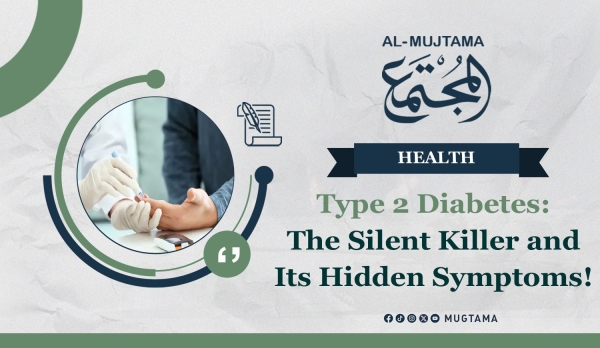Death is a source of fear and anxiety for many people, and the fear of death is closely related to human nature, which Allah has created in people. Since time immemorial, death has occupied the minds and thoughts of humanity, raising questions, and people wish they could live for a thousand years without dying, as Allah says: "One of them wishes that he could be granted life a thousand years." (Al-Baqarah: 96). Thus, a person quickly eats when feeling hungry, seeks water with all his strength when feeling thirsty, visits doctors, and takes medicine when experiencing symptoms of illness, as whenever his life is threatened by danger, he strives hard to avoid it for fear of death. This is the nature of humans.
However, some dangers and diseases do not allow their victims the chance to prepare or confront them; they strike suddenly without any prior symptoms. One such disease is type 2 diabetes, which occurs due to the resistance of cells to insulin or the pancreas's inability to produce enough insulin to maintain healthy blood sugar levels.
Type 2 Diabetes as a Trial and Expiation for Sins
Type 2 diabetes is a condition that occurs due to problems in the body's regulation of sugar and its use to provide energy. This type causes an excess amount of sugar in the blood, which, over time, can lead to disturbances in the circulatory, nervous, and immune systems.
Islamic law teaches us that illness is a test from Allah, and through it, Allah expiates the sins of His servants and raises their ranks, as mentioned in the hadith: "No Muslim is afflicted by difficulty, continuous pain, anxiety, grief, injury, or care, or even by a thorn with which he is pierced, without God thereby making an atonement for his sins." (Narrated by Bukhari and Muslim).
Patience, Anger, and Their Relationship with Type 2 Diabetes
Type 2 diabetes is one of the diseases that often appears suddenly, usually without prior symptoms. Those affected by this disease are often quick to anger, as its symptoms develop very slowly, if at all, and they are accompanied by numerous issues that can provoke anger, such as frequent and excessive urination, unintended weight loss, constant thirst and hunger, tingling in the feet and hands, frequent infections, and blurry vision. All of these symptoms and complications require patience, adaptability, and careful management.
Islamic teachings consistently discourage anger. It was narrated that a man said, "O Messenger of Allah, tell me something concise that I can remember." The Prophet (peace be upon him) said: "Do not get angry." He repeated this advice, and each time the Prophet said: "Do not get angry." Anger harms the individual, causing many illnesses, including type 2 diabetes. When a person becomes angry, the body releases stress hormones like cortisol and adrenaline, which increase blood sugar levels and cause insulin resistance, thus leading to the development of the disease.
Causes of Type 2 Diabetes within Islamic Principles
Islamic law consistently emphasizes moderation, avoiding bad habits, and taking care of one’s health and body. The Prophet (peace be upon him) said: "A believer who is strong (and healthy) is better and dearer to Allah than the weak believer." From this, we can deduce the main causes of type 2 diabetes from a religious perspective:
- Overeating and Overdrinking: Not moderating food intake, consuming sugars and fats, and the resulting obesity are key causes of type 2 diabetes. Islam commands moderation in eating, as Allah says: "And eat and drink, but do not be extravagant. Indeed, He likes not those who commit excess." (Al-A'raf: 31), and the Prophet (peace be upon him) said: "A human being fills no worse vessel than his stomach. It is sufficient for a human being to eat a few mouthfuls to keep his spine straight."
- Lack of Physical Activity and Laziness: A sedentary lifestyle and lack of physical activity increase the risk of diabetes. Therefore, the Prophet (peace be upon him) encouraged physical activity and advised his companions to engage in exercise.
- Anger: Controlling anger is crucial to preventing diabetes. The Prophet (peace be upon him) said: "The strong man is not the good wrestler; but the strong man is he who controls himself when he is angry."
- Neglecting Health and Despairing of Recovery: Some people, upon learning they have a certain illness, despair and await death without taking the necessary steps to seek treatment. This is prohibited in Islamic teachings, as the Prophet (peace be upon him) said: "Make use of medical treatment, for Allah has not made a disease without appointing a remedy for it."
- Poor Mental Health: Some people, upon being diagnosed with diabetes, panic and lose patience, which leads to worsening the disease instead of managing it.
From this, it is clear that type 2 diabetes is one of the most serious diseases a person can face. It requires patience and perseverance. The best ways to prevent it, according to Islamic teachings, include engaging in physical activities, maintaining a healthy diet, avoiding obesity and laziness, following the example of the Prophet (peace be upon him), and advising his companions to do the same. For example, Abdullah ibn Umar narrated that "Allah's Messenger (ﷺ) ordered for a horse race; the trained horses were to run from a place called Al-Hafya' to Thaniyat Al-Wada` and the horses which were not trained were to run from Al-Thaniya to the Masjid (mosque of) Bani Zuraiq." He also raced his wife, the Mother of the Believers, Aisha (may Allah be pleased with her), sometimes she would win, and sometimes he would win, saying: "This is for that outstripping." (Narrated by Abu Dawood and Ahmad).
-------------------------------------------------------------


